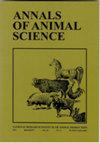Effects of different salinity levels on performance of Nile tilapia fingerlings in a biofloc culture system
IF 2.2
4区 农林科学
Q2 AGRICULTURE, DAIRY & ANIMAL SCIENCE
引用次数: 2
Abstract
Abstract Especially in arid regions, developing tilapia culture with the ability to survive a wide range of salinities is crucial due to the limited availability of fresh water for aquaculture. The present study focused on evaluating the growth performance of Nile tilapia in a biofloc system under three salinity levels: 0 (BFT0), 4 (BFT4), and 8 g/L (BFT8). Fingerling fish were raised for 37 days in tanks with a water volume of 140 liters and a stocking density of one fish per liter. The results of the water quality parameters showed that dissolved oxygen and pH decreased with increasing salinity. Furthermore, the BFT8 group had the highest concentrations of settled solid (19.98 ml/L) and total suspended solid (428.37 mg/L), while the BFT8 group had the lowest TAN concentration (4.32 mg/L). The final weight and specific growth rate were significantly higher in the BFT8 and BFT4 groups compared to the BFT0 group. Survival rates were not significantly different across treatments, and all of them were higher than 97%. The protein and lipid content of Nile tilapia bodies and bioflocs decreased with increasing salinity, while the ash content increased. The highest body ash content in Nile tilapia (13.81% of dry weight) and bioflocs (31.78% dry weight) was found at 8 g/L salinity. Based on the present study, it is suggested that salinities of 4 and 8 g/L can improve water quality, growth performance, survival, and carcass composition of Nile tilapia fingerlings in the biofloc system. This finding suggests that brackish waters can be utilized for sustainable aquaculture for the rearing of Nile tilapia.不同盐度对生物就地养殖尼罗罗非鱼鱼种生产性能的影响
摘要特别是在干旱地区,由于水产养殖淡水供应有限,发展能够在各种盐度下生存的罗非鱼养殖至关重要。本研究的重点是评估尼罗罗非鱼在三个盐度水平下的生长性能:0(BFT0)、4(BFT4)和8g/L(BFT8)。手指鱼在水箱中饲养37天,水箱的水量为140升,放养密度为每升一条鱼。水质参数的结果表明,溶解氧和pH值随盐度的增加而降低。此外,BFT8组的沉降固体浓度最高(19.98毫升/升),总悬浮固体浓度为428.37毫克/升,而BFT8的TAN浓度最低(4.32毫克/升)。与BFT0组相比,BFT8和BFT4组的最终重量和比生长率显著更高。不同治疗的存活率没有显著差异,且均高于97%。尼罗罗非鱼体和生物礁的蛋白质和脂质含量随着盐度的增加而降低,而灰分含量则增加。在盐度为8g/L时,尼罗罗非鱼(占干重的13.81%)和生物絮凝剂(干重的31.78%)的灰分含量最高。根据本研究,4和8g/L的盐度可以改善生物絮凝系统中尼罗罗非鱼鱼种的水质、生长性能、存活率和胴体组成。这一发现表明,微咸水可以用于尼罗河罗非鱼的可持续养殖。
本文章由计算机程序翻译,如有差异,请以英文原文为准。
求助全文
约1分钟内获得全文
求助全文
来源期刊

Annals of Animal Science
农林科学-奶制品与动物科学
CiteScore
4.00
自引率
5.30%
发文量
138
审稿时长
6-12 weeks
期刊介绍:
Annals of Animal Science accepts original papers and reviews from the different topics of animal science: genetic and farm animal breeding, the biology, physiology and reproduction of animals, animal nutrition and feedstuffs, environment, hygiene and animal production technology, quality of animal origin products, economics and the organization of animal production.
 求助内容:
求助内容: 应助结果提醒方式:
应助结果提醒方式:


